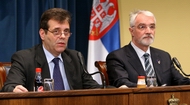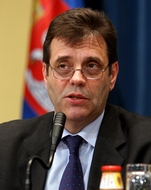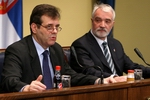Q:
A:
Successful work of Serbian government in past two years
Belgrade,
3 March 2006
Serbian Prime Minister Vojislav Kostunica said today that some of the achievements of the Serbian government during its two-year mandate are acquisition of the Feasibility Study, start of negotiations on the Stabilisation and Association Agreement with the EU, resolution of the issue of cooperation with the Hague tribunal, and preparation for the negotiations on Kosovo status, and the political consensus reached in the Serbian parliament.
Speaking at a press conference held on the occasion of the second anniversary of the government's formation, Kostunica said that other achievements are the conclusion of a three-year arrangement with the International Monetary Fund, reduction of the foreign trade deficit, and high inflow of foreign direct investment, totalling $1.5 billion.
He recalled that over the past two years, the Serbian parliament adopted 208 laws, of which 25 regulate completely new areas.
According to Kostunica, the government strengthened the state's democratic institutions and some completely new were formed, such as the institution of the ombudsman, the national minorities' council, the commissioner for information of public importance and others.
Kostunica said that the restructuring of public companies was launched, production is recording constant growth, exports have increased, and salaries grew by 5.7% in real terms.
He said that relations within the state union will be resolved in the European way and recalled that the EU is involved in that process, adding that he is optimistic when it comes to the survival of the joint state with Montenegro.
The Serbian Prime Minister reminded the public that during the mandate of this government 17 suspects voluntary surrendered to the Hague tribunal and 13 persons were released pending trial.
Kostunica reiterated that the resolution of the case of General Ratko Mladic and the completion of cooperation with the Hague tribunal is Serbia's primary interest and added that the Serbian government's cooperation with the Hague tribunal realised so far does not leave room to doubt that the remaining obligations will be fulfilled.
He recalled that over the past two years, the Serbian parliament adopted 208 laws, of which 25 regulate completely new areas.
According to Kostunica, the government strengthened the state's democratic institutions and some completely new were formed, such as the institution of the ombudsman, the national minorities' council, the commissioner for information of public importance and others.
Kostunica said that the restructuring of public companies was launched, production is recording constant growth, exports have increased, and salaries grew by 5.7% in real terms.
He said that relations within the state union will be resolved in the European way and recalled that the EU is involved in that process, adding that he is optimistic when it comes to the survival of the joint state with Montenegro.
The Serbian Prime Minister reminded the public that during the mandate of this government 17 suspects voluntary surrendered to the Hague tribunal and 13 persons were released pending trial.
Kostunica reiterated that the resolution of the case of General Ratko Mladic and the completion of cooperation with the Hague tribunal is Serbia's primary interest and added that the Serbian government's cooperation with the Hague tribunal realised so far does not leave room to doubt that the remaining obligations will be fulfilled.
He said that it is in the interest of Serbia, the government and in his own personal interest that the case is taken off the agenda.
Kostunica said that the Serbian government's failure is the non-adoption of a new constitution of Serbia. He explained that the reason for that is a lack of consensus between parliamentary parties on that issue, recalling that the Serbian government prepared the draft constitution and submitted it to the Serbian parliament as early as June 2004.
The Prime Minister pointed out that passing a new constitution is Serbia's obligation in the process of its European integration.
Kostunica said that during the war in Bosnia no genocide was committed against Muslims. Therefore, a charge which the authorities in Sarajevo filed against Serbia-Montenegro at the International Court of Justice in the Hague is disputable, both in its essence and formality.
He explained that the essential disputability of the charge lies in its effort to prove something that didn’t happen, and that is genocide. It is also formally disputable because it was filed by an unauthorised body.
Kostunica pointed out that it was necessary for all three constitutional nations represented in the Bosnian parliament to agree on filing such a charge, but the consent of Serbs was never obtained.
He also said that the appointment of Commander of Kosovo Protection Corpus Agim Ceku to the position of Prime Minister elect of the new Kosovo government is highly unacceptable, because he has been charged with war crimes in Serbian courts.
At the conference, Serbian Deputy Prime Minister Miroljub Labus expressed his satisfaction with the course of talks with the European Union. He said he is convinced that the Stabilisation and Association Agreement could be signed ahead of schedule, that is in early autumn.
Labus recalled that the current Serbian government has inherited a great foreign debt, a deficit in the budget and EU sanctions on sugar exports, but has not left a single problem unresolved.
He said that last year the World Bank, the European Bank for Reconstruction and Development (EBRD) and the US Chamber of Commerce all congratulated Serbia on improving the business climate in the country. He added that for the first time Serbia received a credit rating, which has improved upon three occasions.
"We have become a reliable partner of the international community and its citizens", said Labus and added that the government has fulfilled all its promises, including regular pension and social welfare payments, resolution of the issue of foreign debt and improvement of the economic climate in the country, as well as issuing of favourable loans to farmers and grants for successful students.
Kostunica said that the Serbian government's failure is the non-adoption of a new constitution of Serbia. He explained that the reason for that is a lack of consensus between parliamentary parties on that issue, recalling that the Serbian government prepared the draft constitution and submitted it to the Serbian parliament as early as June 2004.
The Prime Minister pointed out that passing a new constitution is Serbia's obligation in the process of its European integration.
Kostunica said that during the war in Bosnia no genocide was committed against Muslims. Therefore, a charge which the authorities in Sarajevo filed against Serbia-Montenegro at the International Court of Justice in the Hague is disputable, both in its essence and formality.
He explained that the essential disputability of the charge lies in its effort to prove something that didn’t happen, and that is genocide. It is also formally disputable because it was filed by an unauthorised body.
Kostunica pointed out that it was necessary for all three constitutional nations represented in the Bosnian parliament to agree on filing such a charge, but the consent of Serbs was never obtained.
He also said that the appointment of Commander of Kosovo Protection Corpus Agim Ceku to the position of Prime Minister elect of the new Kosovo government is highly unacceptable, because he has been charged with war crimes in Serbian courts.
At the conference, Serbian Deputy Prime Minister Miroljub Labus expressed his satisfaction with the course of talks with the European Union. He said he is convinced that the Stabilisation and Association Agreement could be signed ahead of schedule, that is in early autumn.
Labus recalled that the current Serbian government has inherited a great foreign debt, a deficit in the budget and EU sanctions on sugar exports, but has not left a single problem unresolved.
He said that last year the World Bank, the European Bank for Reconstruction and Development (EBRD) and the US Chamber of Commerce all congratulated Serbia on improving the business climate in the country. He added that for the first time Serbia received a credit rating, which has improved upon three occasions.
"We have become a reliable partner of the international community and its citizens", said Labus and added that the government has fulfilled all its promises, including regular pension and social welfare payments, resolution of the issue of foreign debt and improvement of the economic climate in the country, as well as issuing of favourable loans to farmers and grants for successful students.













